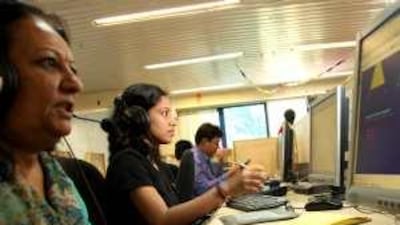BANGALORE // Every day at 2am, Sapna Ajay, an English teacher in Raipur, wakes up to begin her lessons. As her first cup of coffee hits, Ms Ajay switches on her computer to connect with her student, who is sitting half a world away in the US. Receiving grammar lessons from an Indian teacher using an imperfect American accent at the other side of the globe may sound bizarre, but teaching in a virtual classroom has never been cheaper and more convenient, she says.
"The only difference is that I cannot see my student," says Ms Ajay, 40, who was a schoolteacher before becoming a remote tutor. "But given that I don't have to battle traffic and pollution every day to get to a physical classroom, this is much better." Ms Ajay is employed with Tutorvista, a US$38 million (Dh139.5m) outsourcing firm based in Bangalore, which was launched three-and-a-half years ago.
The company offers personalised coaching online to 20,000 students, from undergraduates to elementary school students, most of them in the US. India has in recent years emerged as a lucrative outsourcing hub, offering low costs and a large pool of educated talent. The business of remote tutoring, or hiring a qualified tutor over the internet, had an estimated worth of $250m in 2006 and is expected to be worth $2 billion by 2015, a 2007 study by the global knowledge firm Evalueserve shows.
"When I was launching my firm, I thought to myself 'is it possible to marry internet technology and well qualified tutors to provide affordable education?'" says Krishnan Ganesh, the chief executive and founder of Tutorvista. "Remote tutoring makes it possible." Outsourcing firms such as Tutorvista, or US companies founded by Indian expatriates such as TutorCo, a start-up firm based in Minnesota, and Growing Stars, based in California, employ a large number of Indian teachers well known for their maths and science acumen who charge only a fraction of US tutor fees.
Most of them provide a subscription-based service model, charging a weekly or monthly fee. Tutorvista charges $100 a month for unlimited tutoring. "It's like offering a buffet to a student," Mr Ganesh says. "Study as much as you can for $100." Students interact with teachers over a home-based digital whiteboard and a voice application software devised by Tutorvista. The company employs 2,100 teachers, up from 800 last year, across 120 locations. Business has grown by 400 per cent in the past year to 20,000 students from 5,000, spurred tremendously by the recession.
"During recession, economic opportunities are lean," says Mr Ganesh. "People focus on enhancing their education and skills. People start penny-pinching and look for affordable solutions and services. "We've only captured a small market of the 60 million students in the US. Our market share is expected to grow even after the recession is over, given its lucrative pricing." As its popularity surges, the company is looking to double its number of teachers to 4,000 in the next two months before schools in the US reopen after the Christmas break.
"You cannot double the operations in two months of a physical school made of brick and mortar," Mr Ganesh says. "But that kind of growth is absolutely possible for a virtual classroom." Remote tutoring has opened up a world of opportunities for India's well qualified teachers, especially for those in rural and remote towns, where job opportunities are scarce. Twenty per cent of its tutors are PhD holders and 60 per cent hold master's degrees. Many of them are retired civil servants and housewives looking to earn some extra cash.
About 90 per cent of them would be unemployed if Tutorvista did not come their way, Mr Ganesh claims. "In some remote corners of India, there are jobs available only in tea gardens and factories," he says. "What will a PhD holder do in a tea garden? "There are also conservative Hindu and Muslim families that aren't comfortable sending their women out to work, but teaching from home is not an issue for anyone, especially if you don't have to meet with your student face-to-face."
The teachers, who earn between 8,000 rupees (Dh629) and 20,000 rupees a month based on assignment and qualifications, are only expected to know English, have knowledge about their subject and own a computer. Before he started his business, Mr Ganesh approached nine venture capitalists to fund it. Eight of them turned him down. Only Sequoia Capital India saw the potential in his business and injected $2m. The others had plenty of reservations about his business model. As most teachers in India were not well trained with computers, how would the company monitor activities of employees operating from home?
Mr Ganesh says Tutorvista offers six-week online training in US curriculum, method of instruction and accent before hiring a teacher. It also designed a software that allows them to record and observe each tutoring session. "If a student logs off in a few minutes, we try and get to the bottom of why that happened," he says. "Was he not satisfied with the teacher?" But the venture capitalists were mainly concerned with whether it was really possible to match the benefits of personal face-to-face coaching.
"On the internet, people will buy John Grisham and Harry Potter, they said, but not such an intangible service," Mr Ganesh says. "But they were proved wrong, weren't they?" As business grew, Tutorvista received additional funding. Manipal Education and Medical Group (MEMG) invested $2.5m in October 2007. In June this year, Tutorvista received $12.5m from Pearson group, the UK publishing giant, and another $6.5m from MEMG.
business@thenational.ae

